20 Apr2021
By Ann Marie Wernick
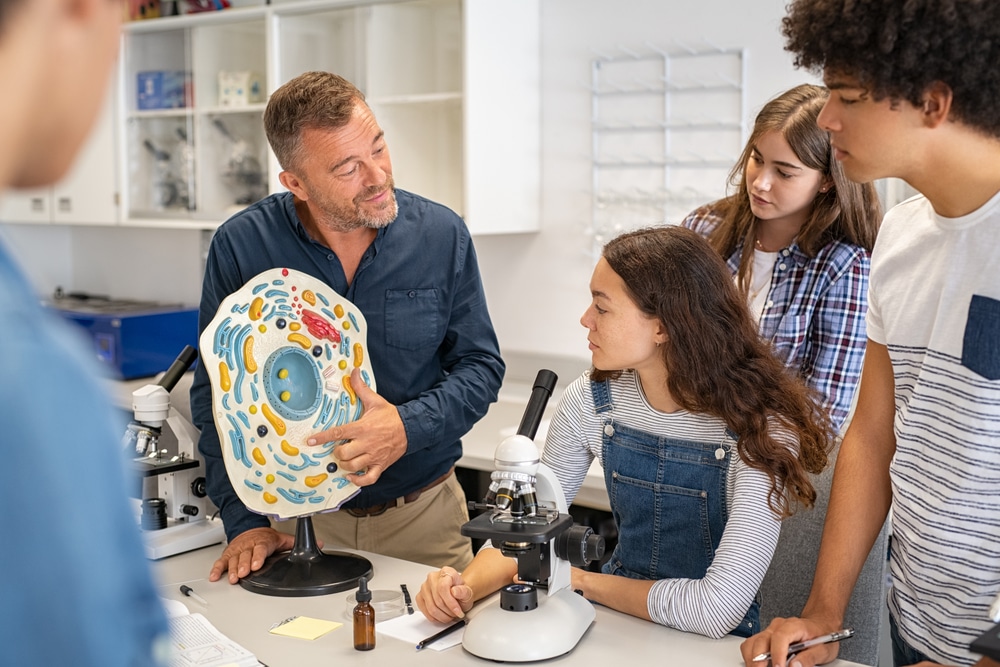
AACTE is excited to announce the call for applications for the Conference to Design Simulations that Enhance the Clinical Preparation of Secondary Science Teachers. Funded by the National Science Foundation (NSF) Discovery Research PreK-12 convening grant, the purpose of this conference is to convene experts across the country to (1) identify significant gaps in the clinical preparation of science educators (2) ideate on virtual environments that help address those gaps, and (3) develop scenarios through design thinking for EPPs to implement within their programs.
The conference attendees will be comprised of current high school science teachers, current science teacher candidates, experts in science education, experts in the use of simulation in educator preparation, experts in culturally responsive teaching practices in the sciences, experts in the Next Generation Science Standards, simulation specialists and representatives from partner organizations. Participants must commit to attending three days of the virtual conference (June 8, 9, and 10) along with three monthly (July, August and September) virtual meetings following the conference.
20 Apr2021
By Lynn M. Gangone
AACTE is mobilizing our professional community to advocate for funding authorized by the recent American Rescue Plan Act (ARPA) to aid schools and colleges of education in recovery from the pandemic. AACTE has distributed materials to begin the advocacy work in this area and will continue to provide members with resources and tools. Please take a few minutes to
watch this video and learn more about how you can get involved.
Stay tuned to the AACTE Advocacy Center for updates at
aacte.org. Be sure to renew your AACTE
membership by the extended May 31 deadline.
20 Apr2021
By Matthew Wales
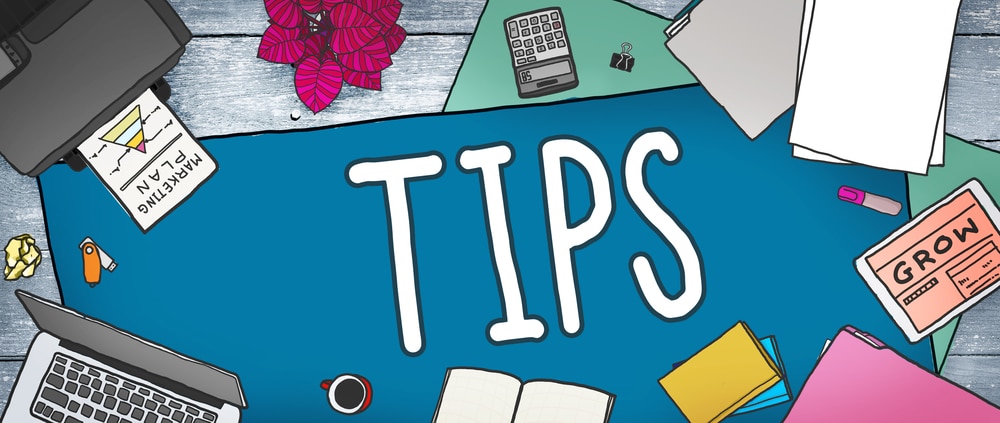 Although entirely virtual, participants were amazed at the volume of opportunities to engage with scholars, network with fellow colleagues, and collaborate on topics important to education and educator preparation during AACTE’s 2021 Annual Meeting. With over 150 presentations addressing the theme of “Resisting Hate, Restoring Hope: Engaging in Courageous Actions,” attendees united in efforts to disrupt inequities while educating for inclusion and change. And as AACTE eagerly begin preparations to meet in-person at the 2022 Annual Meeting in New Orleans, participants will play a vital role as we “Rethink, Reshape, Reimagine, Revolutionize: Growing the Profession Post Pandemic.”
Although entirely virtual, participants were amazed at the volume of opportunities to engage with scholars, network with fellow colleagues, and collaborate on topics important to education and educator preparation during AACTE’s 2021 Annual Meeting. With over 150 presentations addressing the theme of “Resisting Hate, Restoring Hope: Engaging in Courageous Actions,” attendees united in efforts to disrupt inequities while educating for inclusion and change. And as AACTE eagerly begin preparations to meet in-person at the 2022 Annual Meeting in New Orleans, participants will play a vital role as we “Rethink, Reshape, Reimagine, Revolutionize: Growing the Profession Post Pandemic.”
Ready to be a part of the change during AACTE’s 2022 Annual Meeting in New Orleans? Year after year, demand to present at the Annual Meeting continues to remain high, and only the “best of the best” content is ultimately selected for presentation during the conference. Want your proposal to be a cut above the rest? Then be sure to follow these tips for submitting a competitive proposal:
19 Apr2021
By David Fuentes and Amy Ginsberg
In the following article, David A. Fuentes and Amy Ginsberg of the College of Education at William Paterson, a member of AACTE’s Network Improvement Community (NIC) Black and Hispanic/Latino Male Teacher Initiative, take a deep dive into their efforts to increase dual enrollment opportunities as a preemptive recruitment strategy. They provide insight into how network improvement science can be used to identify levers within education preparation program systems that can improve recruitment and retention of diverse teacher candidates.
To learn more about NIC members’ initiatives to recruit and retain Black and Latina males, watch the Building Recruitment Pathways, a segment of AACTE’s new NIC video case studies series.
Building and Sustaining Recruitment Pathways for Black and Latino Male Teachers
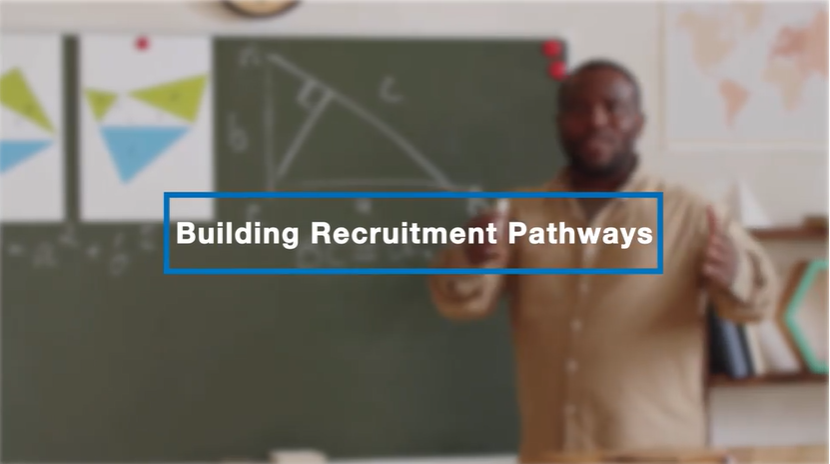 In 2014, our College of Education at William Paterson University, a Hispanic Serving Institution (HSI) and Minority Serving Institution (MSI), located in the greater New York City area, was selected as one of ten universities to participate in the AACTE Network Improvement Community (NIC), aimed at increasing the number of Black and Latino/Hispanic male teachers (BLMs). Since that time, we have been engaged in iterative cycles of plan-do-study-act (PDSA). This systematic research first led to our becoming NIC mindful and then to several structural changes in our College of Education that make our efforts aimed at teacher diversification more possible today in both theory and practice. We have uncovered, implemented, and tested the efficacy of several structural changes at our institution targeting key drivers, recruitment and retention, while implementing new structures based on network improvement science and our desire and commitment to diversify our teacher candidate pool.
In 2014, our College of Education at William Paterson University, a Hispanic Serving Institution (HSI) and Minority Serving Institution (MSI), located in the greater New York City area, was selected as one of ten universities to participate in the AACTE Network Improvement Community (NIC), aimed at increasing the number of Black and Latino/Hispanic male teachers (BLMs). Since that time, we have been engaged in iterative cycles of plan-do-study-act (PDSA). This systematic research first led to our becoming NIC mindful and then to several structural changes in our College of Education that make our efforts aimed at teacher diversification more possible today in both theory and practice. We have uncovered, implemented, and tested the efficacy of several structural changes at our institution targeting key drivers, recruitment and retention, while implementing new structures based on network improvement science and our desire and commitment to diversify our teacher candidate pool.
19 Apr2021
By Jacqueline E. King, Ph.D.
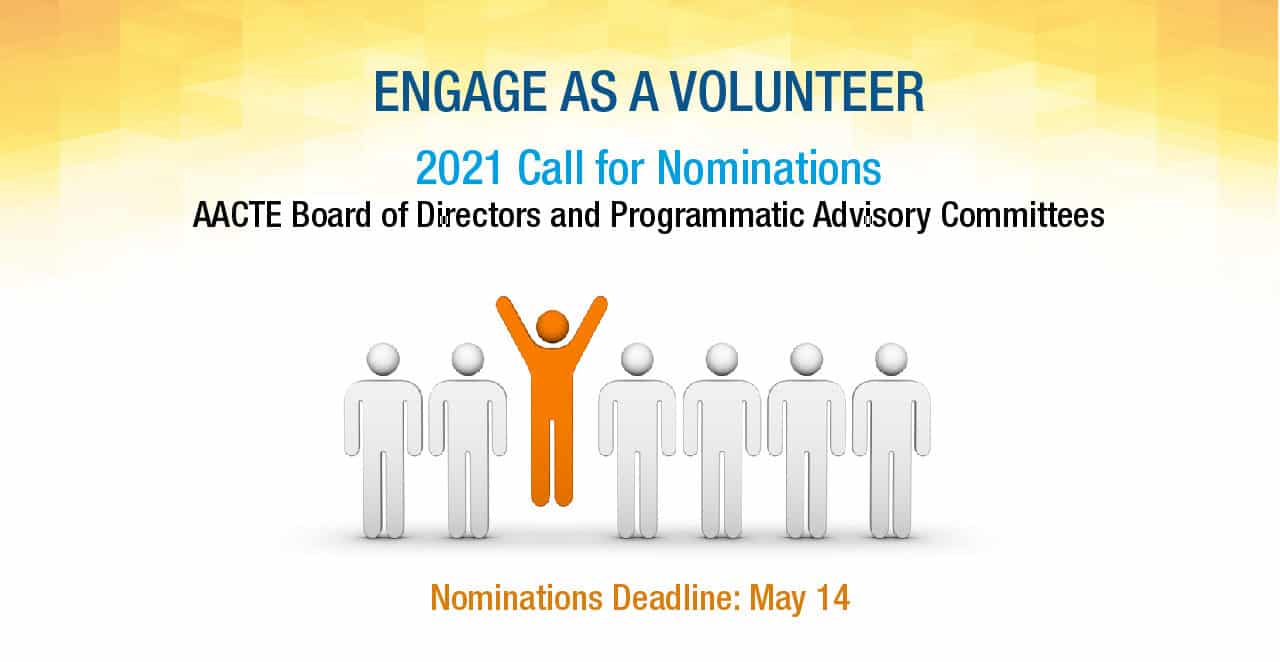
These are extraordinary times, and educator preparation is essential to our national recovery. Now more than ever, your association needs committed, talented, and thoughtful leaders!
Are you ready to assume a leadership role in the national educator preparation community, or do you know someone who is? Nominate yourself or a colleague by May 14 to serve on the AACTE Board of Directors or a programmatic advisory committee.
AACTE is currently seeking applications from volunteers to stand for election as an at-large representative to the Board of Directors and to serve on the following programmatic advisory committees:
19 Apr2021
By Karen DeMoss and Gretchen Mills
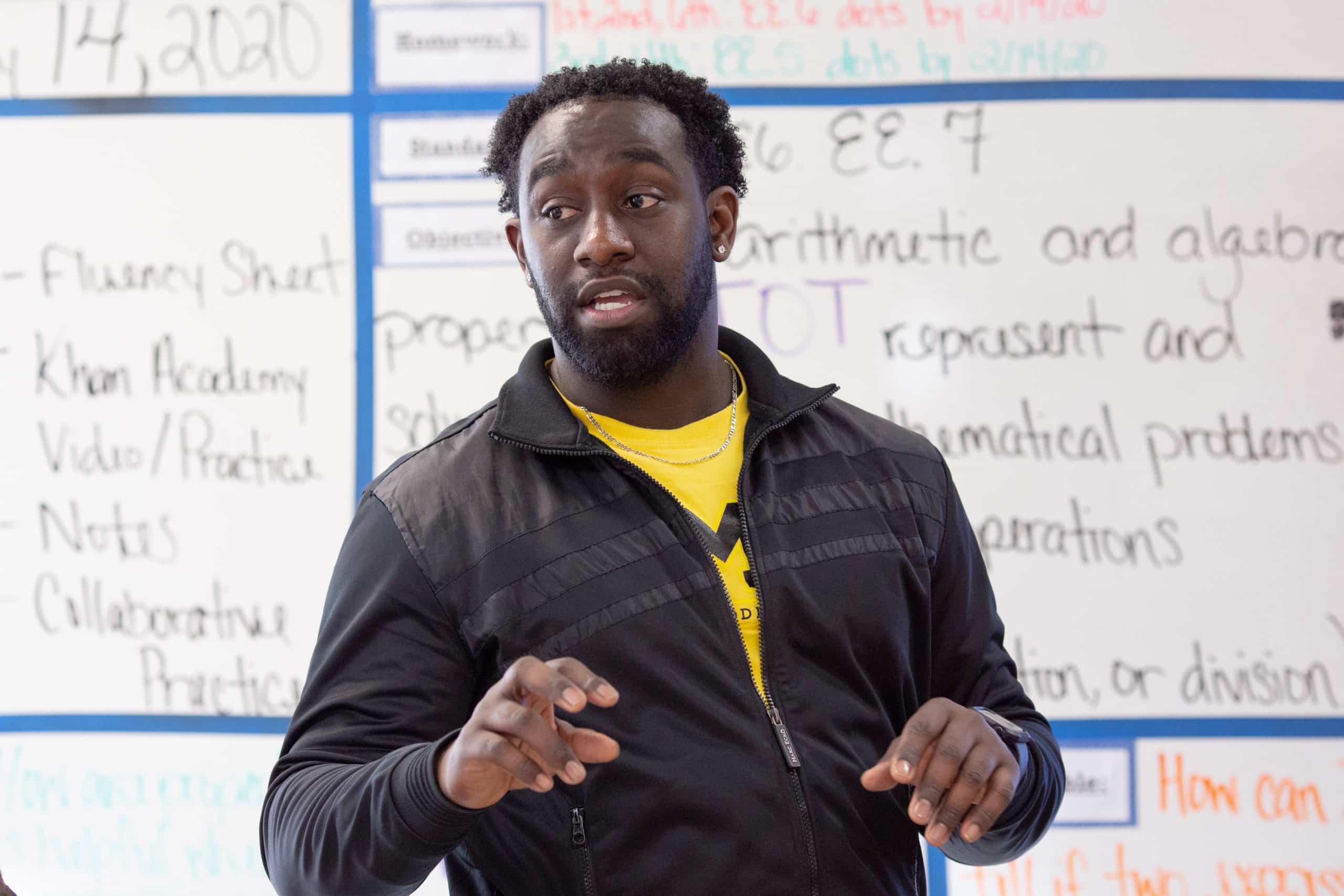
Photo by Allison Shelley for EDUimages
AACTE members have been working to strengthen clinical practice for years, with examples from all across the country—many highlighted in EdPrepMatters each month—of how partnerships between universities and P-12 districts can build great foundations for those aspiring to enter teaching. A dilemma exists for many programs, though, when they increase clinical practice requirements: Candidates—particularly those from under-represented backgrounds[1]—can face financial barriers if clinical placements don’t offer funding to help them fully engage their learning. As Prepared To Teach shared last month through the release of a survey on teacher candidates’ financial burdens, many individuals must either work excessive hours outside of their placements and coursework, or they resort to taking out huge burdens of debt. [2]
With over five years of work with universities, districts, and schools across the country, Prepared To Teach has developed a framework for thinking about how the field might make strong teacher preparation more affordable. Our “3 Rs” of Sustainably Funded Teacher Preparation—Reduction, Reallocation, and (Re)Investment—can help local partnerships bring high quality preparation programs within reach for more aspiring teachers.
19 Apr2021
By Michael Rose

Since the Supreme Court overturned the Voting Rights Act in 2013, we have seen several states pass legislation that makes it more difficult for certain populations to register to vote and/or cast their ballot. Many of these bills disproportionately impact communities of color and/or low-income voters. This effort has intensified in 2021.
According to one count, as of March 24, legislators have introduced 361 bills with restrictive provisions in 47 states. The various pieces of legislation relate to making voter registration more onerous, allowing local elections officials purge voter rolls, limiting early, in-person voting, and/or tightening voter identification requirements, among other things (there are a handful of states that are trying to make it easier for those of voting age to legally register and cast their ballots).
19 Apr2021
By Meghan Grenda
AACTE’s Member Spotlight features an individual from a member institution, highlighting how their work makes a difference in classrooms across the country. Nominate yourself or another member by providing a response to the following questions and sending to mgrenda@aacte.org.
 Get to know Shauna Alishea Torrington …
Get to know Shauna Alishea Torrington …
Position/Institution: Graduate Assistant-International Student and Faculty Services- Ohio University
Number of years in your position: Two years
Alma Mater(s): University of Guyana (2005); Twice alum of Ohio University (2015, 2017)
Hometown: Georgetown, Guyana, South America
- How long have you been a member of AACTE? I have been a member of AACTE?
I have been a member for three years.
- Why did you join AACTE?
I joined AACTE when I became a member of the Holmes Scholar Community at Ohio University.
- Why did you decide to enter the field of educator preparation?
I love to teach, and I know that good teachers make a difference I believe that the teachers have a very important role in the classroom and their preparation for that role is instrumental. My experience in teacher preparation was garnered as a graduate assistant working in the Teacher Education Department of Ohio University.
- What’s been your favorite or most memorable moment of your career so far?
My favorite and most memorable moment in my career is working with mentors in the field that valued my international experiences and area of expertise. Many of whom invited me to their class to talk with their teacher candidates about my experience in and out of the U.S. as a student and as a parent.
16 Apr2021
By Kari Vogelgesang
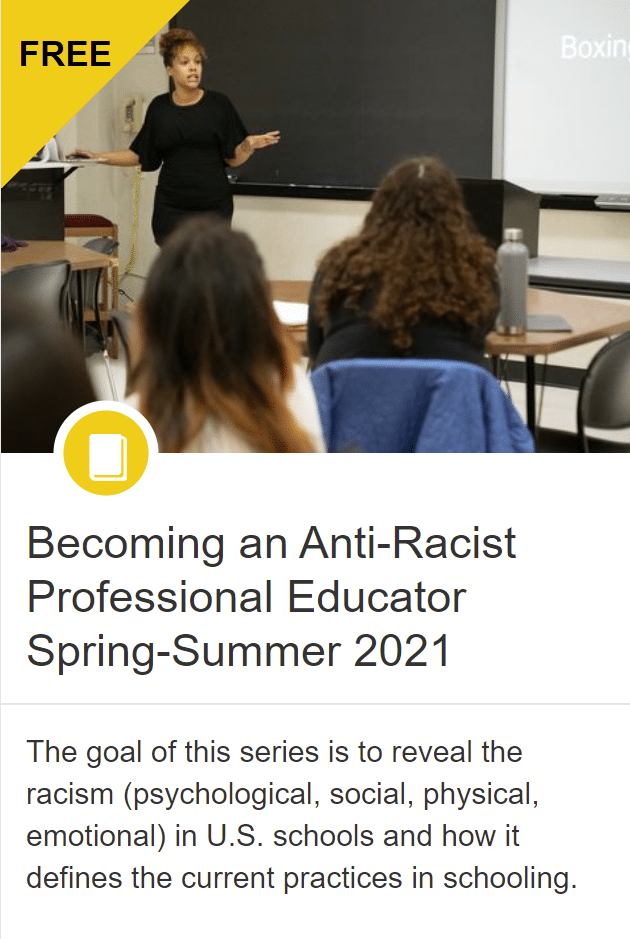 The Baker Teacher Leader Center in the College of Education at the University of Iowa is hosting an Anti-Racism Professional Educator Webinar Series. The goal of this series is to reveal the racism (psychological, social, physical, emotional) in U.S. schools and how it defines the current practices in schooling. We will explore the kinds of changes school personnel must make in their interactions, engagement, and environment to work towards anti-racism. In this series, we will decenter Whiteness and interrogate your positionality within society, but specifically within schools.
The Baker Teacher Leader Center in the College of Education at the University of Iowa is hosting an Anti-Racism Professional Educator Webinar Series. The goal of this series is to reveal the racism (psychological, social, physical, emotional) in U.S. schools and how it defines the current practices in schooling. We will explore the kinds of changes school personnel must make in their interactions, engagement, and environment to work towards anti-racism. In this series, we will decenter Whiteness and interrogate your positionality within society, but specifically within schools.
Educators who register for and attend all nine sessions in the series will earn one free teacher license renewal credit! Register here for the credit. This credit has been pre-approved for state of Iowa teachers. If you live outside the state of Iowa, please contact your administration or board of educational examiners for approval. If you have missed the first few sessions, and are still interested in earning licensure renewal credit, please contact the Baker Teacher Leader Center at tlc@uiowa.edu.
Kari Vogelgesang is clinical associate professor; edTPA coordinator, El Ed & SpEd; and director, professional development at Baker Teacher Leader Center, College of Education, University of Iowa.
16 Apr2021
By Gaelle Gilbert
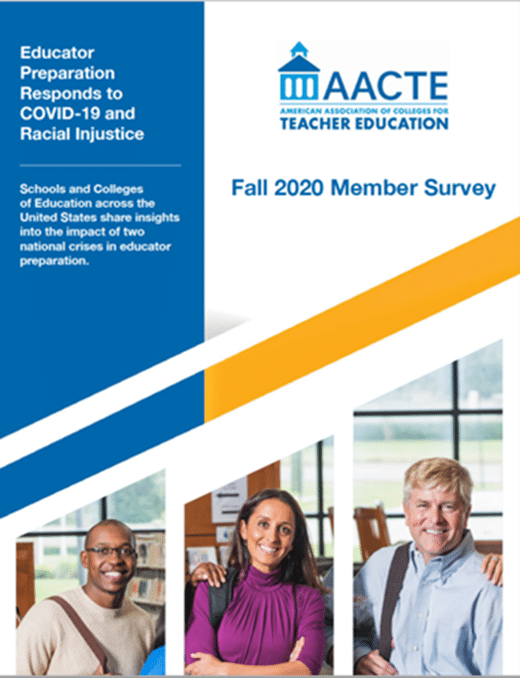 The professional journal for teacher education, Phi Delta Kappan recently published an article about the effects of COVID-19 on teacher education programs, delving deeper into the under reporting of these programs’ struggles caused by the pandemic. The article references AACTE’s two-part member survey that chief representatives of its member institutions responded to about how the twin crises of COVID-19 and racial injustice had affected their educator preparation programs and how they have responded to these crises. The results were included in a report by Jacqueline King released in February.
The professional journal for teacher education, Phi Delta Kappan recently published an article about the effects of COVID-19 on teacher education programs, delving deeper into the under reporting of these programs’ struggles caused by the pandemic. The article references AACTE’s two-part member survey that chief representatives of its member institutions responded to about how the twin crises of COVID-19 and racial injustice had affected their educator preparation programs and how they have responded to these crises. The results were included in a report by Jacqueline King released in February.
Authors Kathryn Choate, Dan Goldhaber, and Roddy Theobald underscore that one of the most relevant issues facing educator preparation programs is the cut in clinical practice available to teacher candidates. To help move these students journeys forward, several states have passed emergency legislation relaxing teacher certificate requirements. The article cites AACTE’s Member Survey to re-enforce the changes happening within these programs—namely the 188 educator preparation programs (across 47 states) that have transitioned, at least partly, to a remote learning environment in Spring 2020.
16 Apr2021
By Dan Goldhaber and Roddy Theobald
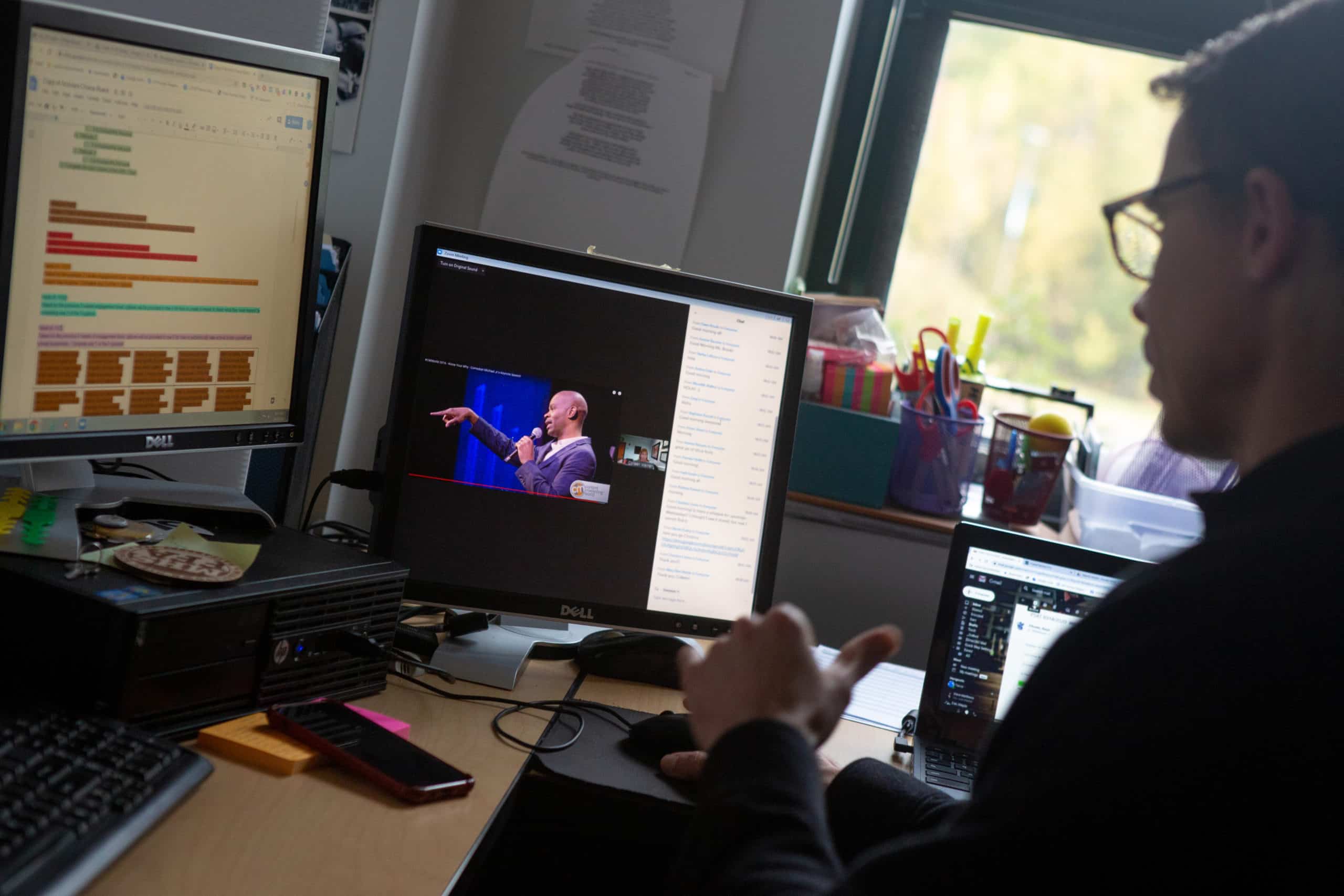 It is clear that the pandemic had a profound impact on teacher education, and clinical practice in particular. The closing of virtually all K-12 schools in the spring of 2020 cascaded back to teacher education, greatly reducing (and certainly altering) the clinical practice experiences of student teachers. This continued into the 2020-21 school year as schools in many communities remained closed for in-person instruction.
It is clear that the pandemic had a profound impact on teacher education, and clinical practice in particular. The closing of virtually all K-12 schools in the spring of 2020 cascaded back to teacher education, greatly reducing (and certainly altering) the clinical practice experiences of student teachers. This continued into the 2020-21 school year as schools in many communities remained closed for in-person instruction.
To examine how the COVID-19 crisis affected the teacher preparation pipeline in the state of Washington, we surveyed 29 state-accredited educator preparation programs (EPPs) from April to June 2020. The findings showed that more than 80% of responding EPPs waived or reduced the length of time required for student teaching in their undergraduate programs, graduate programs, or both. These reductions raise concerns about the preparation of recent cohorts of teacher candidates to join the teaching workforce.
13 Apr2021
By Linda Darling-Hammond and Adam K. Edgerton
This post was originally published on April 5, 2021 by Forbes, and is part of LPI’s Learning in the Time of COVID-19 blog series, which explores strategies and investments to address the current crisis and build long-term systems capacity.

After a year of struggling with distance learning and hybrid models, parents, teachers, and policymakers across the country are concerned about “learning loss” and how to recover from the educational effects of the pandemic. While many of us resist the deficit orientation of learning loss language, these concerns are certainly legitimate: As the crisis began, millions of children, particularly those in low-income communities, lacked access to the computers and connectivity that would make in-person remote learning possible, creating even greater equity gaps than those that already existed.
Furthermore, many low-income communities and communities of color have been especially hard hit by COVID-19, with higher rates of infection, hospitalization and death, as well as greater rates of unemployment and housing and food insecurity. These traumatic events, coupled with the ongoing instances of police shootings of unarmed civilians, have led to a growing and ever more visible divide between the haves and the have-nots, with many students encountering barriers to keeping up in school and others disengaging from school altogether.
13 Apr2021
By K. Stanley Brooks
 Stanley Brooks of Chosen Path Consulting was one of three presenters of the 2021 Annual Meeting session, “Identifying, Understanding, and Replacing Racist Curricula.” In this article, Brooks expounds on the key questions for inquiry and reflection on what it means to engage in an anti-racist (not non-racist) manner in the academic space.
Stanley Brooks of Chosen Path Consulting was one of three presenters of the 2021 Annual Meeting session, “Identifying, Understanding, and Replacing Racist Curricula.” In this article, Brooks expounds on the key questions for inquiry and reflection on what it means to engage in an anti-racist (not non-racist) manner in the academic space.
The reader may perceive the title and guiding question as sarcastic, however, there’s a serious tone and authenticity to the question. If our curriculum is not already anti-racist, then what have we been allowing and promoting all these years? What thoughts and beliefs rooted in racial biases have many educators internalized as children, young adults, and seasoned professionals?
12 Apr2021
By Michael Rose
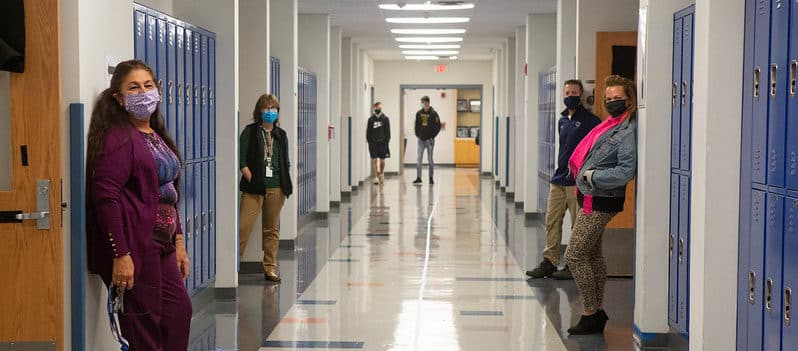
Photo by Allison Shelley for American Education: Images of Teachers and Students in Action
President Biden recently signed into law the American Rescue Plan Act (ARPA), which includes $122 billion for the ARP Elementary and Secondary School Emergency Relief (ARP ESSER) Fund. These funds are provided to state educational agencies and school districts to help safely reopen and sustain the safe operation of schools and address the impact of the coronavirus pandemic on the nation’s students.
The U.S. Department of Education recently announced how much each state will receive through ARP ESSER and that the funds will be available for use through September 2023. The ARP ESSER funds are designed to help alleviate some of the challenges school district leaders face to “hire, recruit, and retain quality staff during severe labor market shortages while providing supplemental emergency benefits and compensation during the pandemic.”
AACTE encourages our members to collaborate with their local partner districts to allocate the ARP ESSER funds towards strengthening the educator workforce by supporting residency models, grow-your-own programs, and other innovative approaches to develop a pathway into teaching. Increasing financial support for teacher candidates is critical to developing and sustaining a diverse, profession-ready teacher workforce. Funding to support teacher candidates could be in place by as early as this fall to assist schools as they fully re-open and to help children overcome learning loss due to the pandemic.
12 Apr2021
By Nicole Dunn
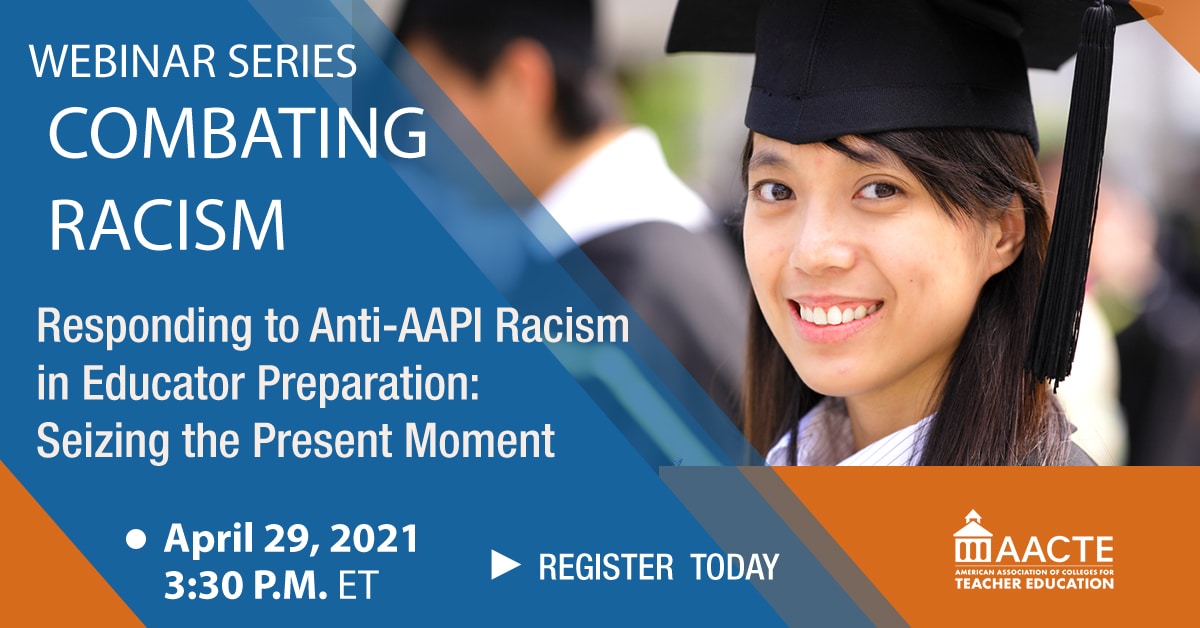 AACTE is honored to welcome another esteemed panel for the third installment of its webinar series, “Combating Racism in Educator Prep.” The third webinar, “Responding to Anti-AAPI Racism in Educator Preparation: Seizing the Present Moment,” centers on the lived experiences of our Asian and Asian American friends, family, colleagues, and students. Valerie Pang, Nicholas D. Hartlep, and Shuhui Fan will discuss the often-omitted history of the Asian American and Pacific Islander (AAPI) community concerning civil rights and the nation’s P–12 education system. The panel will shed light on the current implications of that context for AAPI educators and students, as well as provide a space to discuss strategies and resources institutions of higher education (IHEs) and individuals can use to ensure policies and culture promote safety and belonging for all AAPI people in our education system.
AACTE is honored to welcome another esteemed panel for the third installment of its webinar series, “Combating Racism in Educator Prep.” The third webinar, “Responding to Anti-AAPI Racism in Educator Preparation: Seizing the Present Moment,” centers on the lived experiences of our Asian and Asian American friends, family, colleagues, and students. Valerie Pang, Nicholas D. Hartlep, and Shuhui Fan will discuss the often-omitted history of the Asian American and Pacific Islander (AAPI) community concerning civil rights and the nation’s P–12 education system. The panel will shed light on the current implications of that context for AAPI educators and students, as well as provide a space to discuss strategies and resources institutions of higher education (IHEs) and individuals can use to ensure policies and culture promote safety and belonging for all AAPI people in our education system.



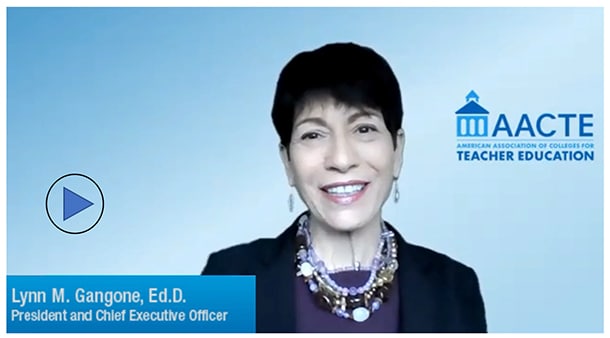
 Although entirely virtual, participants were amazed at the volume of opportunities to engage with scholars, network with fellow colleagues, and collaborate on topics important to education and educator preparation during AACTE’s 2021 Annual Meeting. With over 150 presentations addressing the theme of “Resisting Hate, Restoring Hope: Engaging in Courageous Actions,” attendees united in efforts to disrupt inequities while educating for inclusion and change. And as AACTE eagerly begin preparations to meet in-person at the 2022 Annual Meeting in New Orleans, participants will play a vital role as we “Rethink, Reshape, Reimagine, Revolutionize: Growing the Profession Post Pandemic.”
Although entirely virtual, participants were amazed at the volume of opportunities to engage with scholars, network with fellow colleagues, and collaborate on topics important to education and educator preparation during AACTE’s 2021 Annual Meeting. With over 150 presentations addressing the theme of “Resisting Hate, Restoring Hope: Engaging in Courageous Actions,” attendees united in efforts to disrupt inequities while educating for inclusion and change. And as AACTE eagerly begin preparations to meet in-person at the 2022 Annual Meeting in New Orleans, participants will play a vital role as we “Rethink, Reshape, Reimagine, Revolutionize: Growing the Profession Post Pandemic.”



 Get to know Shauna Alishea Torrington …
Get to know Shauna Alishea Torrington … The Baker Teacher Leader Center in the College of Education at the University of Iowa is hosting an
The Baker Teacher Leader Center in the College of Education at the University of Iowa is hosting an  The professional journal for teacher education, Phi Delta Kappan recently published an article about the effects of COVID-19 on teacher education programs, delving deeper into the under reporting of these programs’ struggles caused by the pandemic. The article references AACTE’s two-part member survey that chief representatives of its member institutions responded to about how the twin crises of COVID-19 and racial injustice had affected their educator preparation programs and how they have responded to these crises. The results were included in a report by Jacqueline King released in February.
The professional journal for teacher education, Phi Delta Kappan recently published an article about the effects of COVID-19 on teacher education programs, delving deeper into the under reporting of these programs’ struggles caused by the pandemic. The article references AACTE’s two-part member survey that chief representatives of its member institutions responded to about how the twin crises of COVID-19 and racial injustice had affected their educator preparation programs and how they have responded to these crises. The results were included in a report by Jacqueline King released in February. It is clear that the pandemic had a profound impact on teacher education, and clinical practice in particular. The closing of virtually all K-12 schools in the spring of 2020 cascaded back to teacher education, greatly reducing (and certainly altering) the clinical practice experiences of student teachers. This
It is clear that the pandemic had a profound impact on teacher education, and clinical practice in particular. The closing of virtually all K-12 schools in the spring of 2020 cascaded back to teacher education, greatly reducing (and certainly altering) the clinical practice experiences of student teachers. This 
 Stanley Brooks of Chosen Path Consulting was one of three presenters of the 2021 Annual Meeting session, “Identifying, Understanding, and Replacing Racist Curricula.” In this article, Brooks expounds on the key questions for inquiry and reflection on what it means to engage in an anti-racist (not non-racist) manner in the academic space.
Stanley Brooks of Chosen Path Consulting was one of three presenters of the 2021 Annual Meeting session, “Identifying, Understanding, and Replacing Racist Curricula.” In this article, Brooks expounds on the key questions for inquiry and reflection on what it means to engage in an anti-racist (not non-racist) manner in the academic space.
 AACTE is honored to welcome another esteemed panel for the third installment of its webinar series, “Combating Racism in Educator Prep.” The third webinar, “
AACTE is honored to welcome another esteemed panel for the third installment of its webinar series, “Combating Racism in Educator Prep.” The third webinar, “